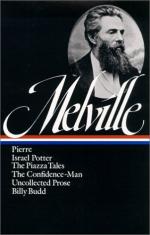After pausing here a moment, he moved on, and observed a man over the way standing still and watching him. Instantly Israel was reminded that he had on the dress of an English sailor, and that it was this probably which had arrested the stranger’s attention. Well knowing that his peculiar dress exposed him to peril, he hurried on faster to escape the village; resolving at the first opportunity to change his garments. Ere long, in a secluded place about a mile from the village, he saw an old ditcher tottering beneath the weight of a pick-axe, hoe and shovel, going to his work; the very picture of poverty, toil and distress. His clothes were tatters.
Making up to this old man, Israel, after a word or two of salutation, offered to change clothes with him. As his own clothes were prince-like compared to the ditchers, Israel thought that however much his proposition might excite the suspicion of the ditcher, yet self-interest would prevent his communicating the suspicions. To be brief, the two went behind a hedge, and presently Israel emerged, presenting the most forlorn appearance conceivable; while the old ditcher hobbled off in an opposite direction, correspondingly improved in his aspect; though it was rather ludicrous than otherwise, owing to the immense bagginess of the sailor-trowsers flapping about his lean shanks, to say nothing of the spare voluminousness of the pea-jacket. But Israel—how deplorable, how dismal his plight! Little did he ween that these wretched rags he now wore, were but suitable to that long career of destitution before him: one brief career of adventurous wanderings; and then, forty torpid years of pauperism. The coat was all patches. And no two patches were alike, and no one patch was the color of the original cloth. The stringless breeches gaped wide open at the knee; the long woollen stockings looked as if they had been set up at some time for a target. Israel looked suddenly metamorphosed from youth to old age; just like an old man of eighty he looked. But, indeed, dull, dreary adversity was now in store for him; and adversity, come it at eighteen or eighty, is the true old age of man. The dress befitted the fate.
From the friendly old ditcher, Israel learned the exact course he must steer for London; distant now between seventy and eighty miles. He was also apprised by his venerable friend, that the country was filled with soldiers on the constant look-out for deserters whether from the navy or army, for the capture of whom a stipulated reward was given, just as in Massachusetts at that time for prowling bears.
Having solemnly enjoined his old friend not to give any information, should any one he meet inquire for such a person as Israel, our adventurer walked briskly on, less heavy of heart, now that he felt comparatively safe in disguise.
Thirty miles were travelled that day. At night Israel stole into a barn, in hopes of finding straw or hay for a bed. But it was spring; all the hay and straw were gone. So after groping about in the dark, he was fain to content himself with an undressed sheep-skin. Cold, hungry, foot-sore, weary, and impatient for the morning dawn, Israel drearily dozed out the night.




